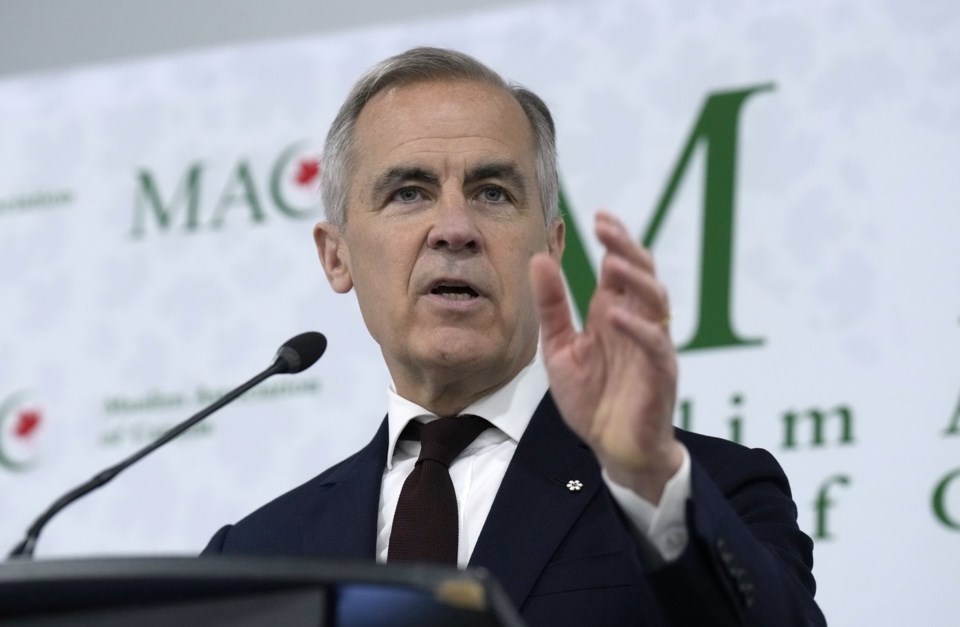OTTAWA — Prime Minister Mark Carney's government introduced legislation Friday that would grant it new powers to quickly push forward major projects the federal cabinet deems to be in the national interest.
Intergovernmental Affairs Minister Dominic LeBlanc tabled a bill in the House of Commons that would give Ottawa the authority to draw up a list of large projects it wants to prioritize and to expedite their federal approval.
Carney said it has become too hard to build new projects in Canada and vowed that this legislation will change that.
"We're in an economic crisis," Carney told a news conference on Parliament Hill on Friday. "We're still facing intensifying, unjustified tariffs from our largest trading partner and the best way to respond to that is to respond at home, build strength at home."
Bill C-5, the "free trade and labour mobility in Canada act and the building Canada act," is twinned legislation meant to break down internal trade barriers and cut red tape for major projects.
The bill was a marquee election promise by Carney, who campaigned on a pledge to make the country an "energy superpower" and build up a more resilient economy in response to U.S. President Donald Trump's global trade war.
The prime minister said he will do everything possible to get the legislation passed this summer and did not rule out having Parliament sit longer.
The House is only scheduled to sit for another two weeks and the Liberals are governing with a precarious minority, forcing them to seek the support of MPs from other parties to advance their agenda.
Conservative Leader Pierre Poilievre described the new bill as a small step in the right direction. He also said it amounts to an admission by the Liberals that their laws have inhibited building and urged the government to take much bolder action.
"We do not need baby steps. We need breakthroughs," he said.
Poilievre said he wants the government to repeal the oil tanker ban on B.C.'s northern coast, terminate the oil and gas sector's emissions cap and scrap the Impact Assessment Act that sets out a process for environmental reviews.
He said he will consult with his caucus about how to approach the bill in Parliament but added that Conservatives would "vote in favour of accelerating even one project."
Canadian Association of Petroleum Producers CEO Lisa Baiton said she is "encouraged by the federal government's flexibility and efforts to work with the provinces to accelerate the approval process for major projects."
But environmental groups warned the new process could upend efforts to fight climate change.
Jessica Clogg, executive director of West Coast Environmental Law, said that past experience shows "rushed approvals without assessment of risks are a recipe for conflict, legal challenges and future environmental disasters."
Keith Stewart of Greenpeace Canada said the government should not fast track new fossil-fuel projects, as Carney has suggested.
"To even consider designating oil and gas expansion projects as in the national interest is a slap in the face to not just the next generation, but every Canadian struggling right now to deal with climate change-fueled wildfires," he said.
The legislation would create a new federal office to take the lead on streamlining approvals for major projects and task the intergovernmental affairs minister with overseeing the final permitting decision.
The government said the goal of the bill is to send a clear signal to businesses and quickly build up investor confidence.
Carney said the current approval process forces projects to undergo multiple reviews and assessments one after another, rather than at the same time.
"That process is arduous. It takes too long and it's holding our country back," he said. "For too long, when federal agencies examined a project, their immediate question has been, ‘Why?' With this new bill, we will ask ourselves, ‘How?'"
The bill sets out five criteria to evaluate whether a project is in the national interest. They include the project's likelihood of success, whether it would strengthen the country's resiliency and advance the interests of Indigenous peoples, and whether it would contribute to economic growth in an environmentally responsible way.
The new federal review office will work toward a goal of approving projects within two years. That's a political promise rather than a hard-and-fast rule; the legislation does not mention timelines.
While the bill would give the government broad power to skirt environmental laws to push projects forward, one expert said it remains to be seen how Ottawa will use it.
"This is the kind of consolidation that you sometimes see in times of national emergency. We see it in wartime, we saw it in COVID to some extent. That consolidation can let you move more quickly, which can be a good thing, but it can also be a risky thing," said Stewart Elgie, the Jarislowsky chair in clean economy at the University of Ottawa.
He warned that trying to "shortcut environmental interests" does not help expedite projects.
"The Harper government never got a major pipeline built, and it's because they gave short shrift to environment and Indigenous concerns. It ended up with blockades and litigation that ultimately slowed down the projects," Elgie said.
Carney said the legislation requires meaningful consultation with Indigenous Peoples consistent with the Constitution and the Crown's duty to consult.
The federal review office will also include an Indigenous Advisory Council with First Nation, Inuit and Métis representation.
The legislation comes with a sunset clause that forces a review of the law after five years.
Carney met with the premiers earlier in the week in Saskatoon, where they privately discussed various projects the premiers want to see quickly launched — including pipelines, trade corridors and mining projects.
The new legislation does not touch on any provincial approvals that might be needed to allow a project to go ahead.
— With files from Sarah Ritchie and Nick Murray
This report by The Canadian Press was first published June 6, 2025.
Kyle Duggan, The Canadian Press




